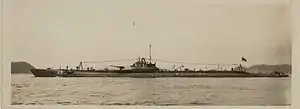Japanese submarine I-61
I-61 was a Kaidai-class cruiser submarine of the KD4 sub-class built for the Imperial Japanese Navy (IJN) during the 1920s. She sank in an October 1941 collision,[2] just prior to Japan's entry into World War II.
 | |
| History | |
|---|---|
| Name: | I-61 |
| Builder: | Mitsubishi Kobe Yard, Kobe, Japan |
| Laid down: | 15 November 1926 |
| Launched: | 12 November 1927 |
| Completed: | 6 April 1929 |
| Commissioned: | 6 April 1929 |
| Decommissioned: | 11 January 1932 |
| Recommissioned: | 1 June 1934 |
| Decommissioned: | 15 November 1939 or 20 March 1940 |
| Recommissioned: | 15 April 1940 or 15 November 1940 |
| Fate: |
|
| Stricken: | 1 April 1942 |
| General characteristics | |
| Class and type: | KD4 Type, Kadai type submarine |
| Displacement: |
|
| Length: | 97.70 m (320 ft 6 in) |
| Beam: | 7.80 m (25 ft 7 in) |
| Draught: | 4.83 m (15 ft 10 in) |
| Propulsion: |
|
| Speed: |
|
| Range: | |
| Test depth: | 60 m (197 ft) |
| Complement: | 58 officers and enlisted |
| Armament: |
|
Construction and commissioning
The first unit of the KD4 sub-class, I-61 was built by Mitsubishi at Kobe, Japan. Her keel was laid on 15 November 1926 and she was launched on 12 November 1927. She was completed on 6 April 1929.
Service history
Upon completion, I-61 was assigned to the Sasebo Naval District.[3] On 24 April 1929, she and her sister ship, the submarine I-62, combined to form Submarine Division 29,[3][4][5] in which I-61 spent her entire career.[3] The division was attached to the Sasebo Naval District.[3]
Submarine Division 29 was reassigned to Submarine Squadron 1 in the 1st Fleet in the Combined Fleet on 1 December 1930.[3] I-61 apparently was decommissioned and placed in reserve on 11 January 1932,[5] and was transferred to the Sasebo Defense Division in the Sasebo Naval District on 10 November 1932,[3] and then to Submarine Squadron 2 in the 2nd Fleet in the Combined Fleet on 15 November 1933.[3] She was recommissioned on 1 June 1934 and subsequently deployed to Manchukuo in Manchuria.[3] On 27 September 1934, she departed Ryojun, Manchukuo, to conduct a training cruise in the Tsingtao area off China.[3] She completed the cruise with her arrival at Sasebo on 5 October 1934.[3]
On 7 February 1935, I-61 departed Sasebo for a training cruise in the Kurile Islands.[3] The cruise concluded with her arrival at Sukumo Bay on 25 February 1935.[3] She got underway from Sasebo on 29 March 1935 for a training cruise in Chinese waters and returned to Sasebo on 4 April 1935.[3] On 15 November 1935, Submarine Division 29 was reassigned to the Sasebo Defense Squadron in the Sasebo Naval District.[3]
On 1 December 1936, I-61 again was assigned to Submarine Squadron 2 in the 2nd Fleet,[3] and on 15 December 1938 she was reassigned to the Submarine School at Kure.[3] On 11 March 1939, I-61 suffered damage in a collision with the Japanese destroyer Yakaze off Mitajiri, Japan.[3][4] Her Submarine School service ended when she was decommissioned and transferred to the Third Reserve in the Sasebo Naval District;[3] sources claim that this took place both on 15 November 1939[3] and on 20 March 1940.[3][5]
On either 15 April 1940 or 15 November 1940,[3] I-61 was recommissioned, and on 15 November 1940 she was reassigned to Submarine Squadron 5 in the Combined Fleet.[3] On 8 January 1941, she collided with the gunboat Kōshū Maru south of Cape Ashizuki, Japan.[3][4]
Loss
On 2 October 1941, with the commander of Submarine Division 29 on board, I-61 departed Sasebo with the submarine tender Rio de Janeiro Maru bound for a fleet gathering point at Murokusumi in Yamaguchi Prefecture. In the Koshiki Channel that evening, the Japanese gunboat Kiso Maru mistook a red light she saw I-61 displaying aft of Rio de Janeiro Maru for that of a smaller vessel and misjudged her passing distance behind I-61. She collided with I-61 around 23:21. I-61 sank quickly, with the loss of all 71 men on board.[2][4][6]
On 20 January 1942 or in February 1942,[3] I-61′s wreck was refloated, and it was sold for scrapping in 1942. I-61 was struck from the naval register on 1 April 1942.
References
Footnotes
- もしくは10ktで10,000海里(『写真 日本の軍艦 第12巻 潜水艦』p57の表より)(in Japanese)
- [#昭和天皇実録八巻]493頁(伊号潜水艦沈没事件)この脚注はこのページ上で2回使用されています。(in Japanese)
- I-61 ijnsubsite.com August 24, 2018 Accessed 28 September 2020
- 『ハンディ版 日本海軍艦艇写真集19巻』72頁。この脚注はこのページ上で4回使用されています。(in Japanese)
- 『艦長たちの軍艦史』428頁。この脚注はこのページ上で3回使用されています。(in Japanese)
- 『日本海軍の潜水艦 - その系譜と戦歴全記録』103頁。(in Japanese)
Bibliography
- 海軍歴史保存会『日本海軍史』第7巻、第9巻、第10巻、第一法規出版、1995年。(in Japanese)
- 勝目純也『日本海軍の潜水艦 - その系譜と戦歴全記録』大日本絵画、2010年。(in Japanese)
- 宮内庁編『昭和天皇実録 第八 昭和十五年至昭和十七年』東京書籍株式会社、2016年3月。ISBN 978-4-487-74408-4。(in Japanese)
- 外山操『艦長たちの軍艦史』光人社、2005年。 ISBN 4-7698-1246-9 (in Japanese)
- 雑誌「丸」編集部『写真 日本の軍艦 第12巻 潜水艦』光人社、1990年。ISBN 4-7698-0462-8 (in Japanese)
- 雑誌「丸」編集部『ハンディ版 日本海軍艦艇写真集19巻』潜水艦伊号、光人社、1997年。(in Japanese)